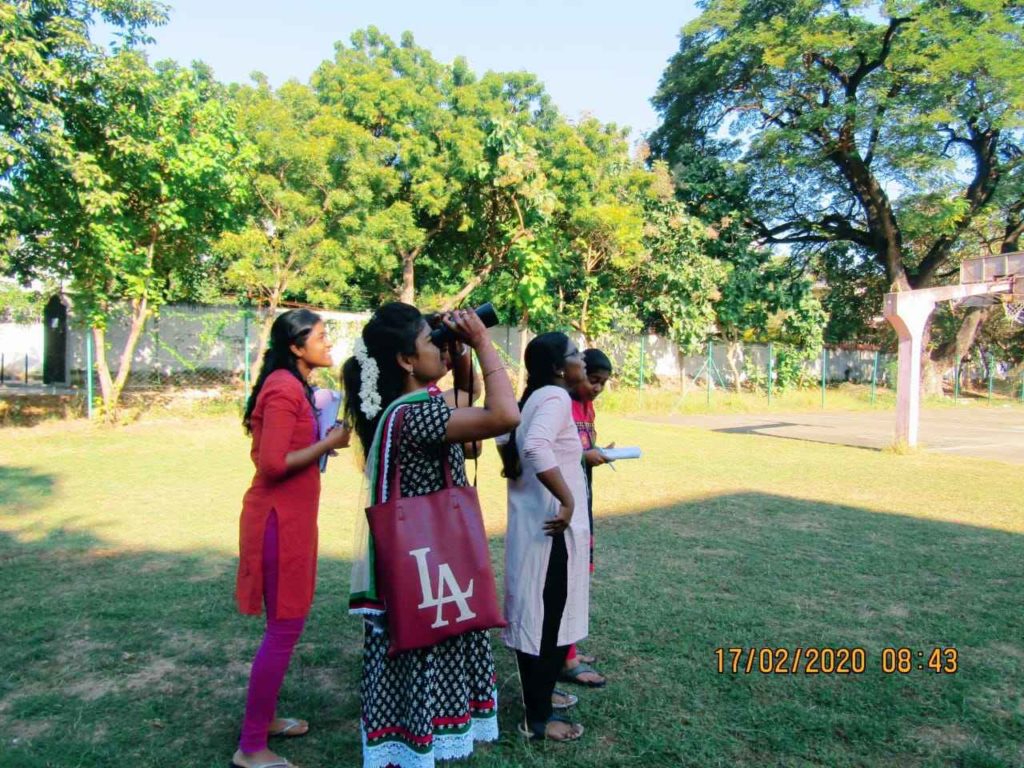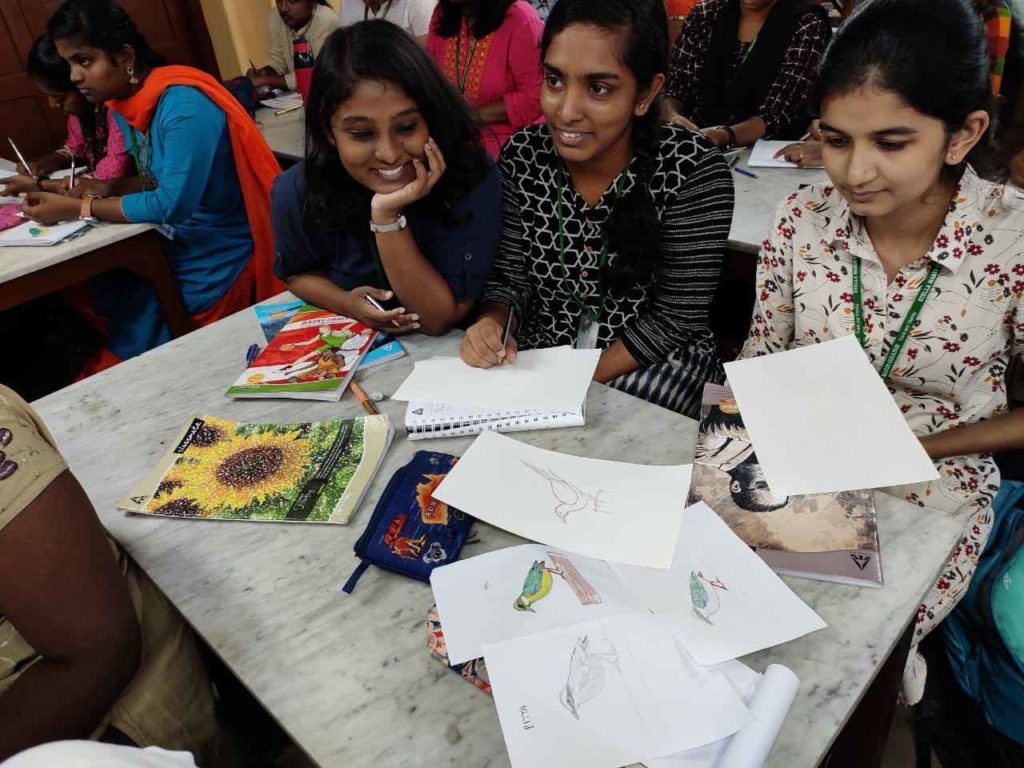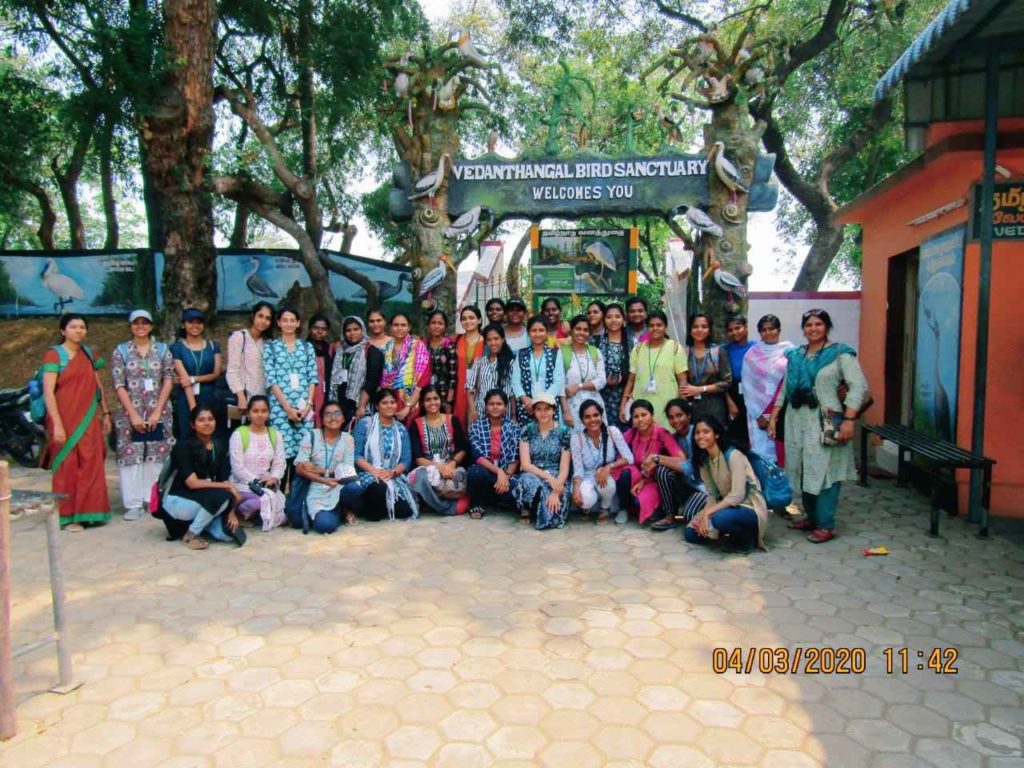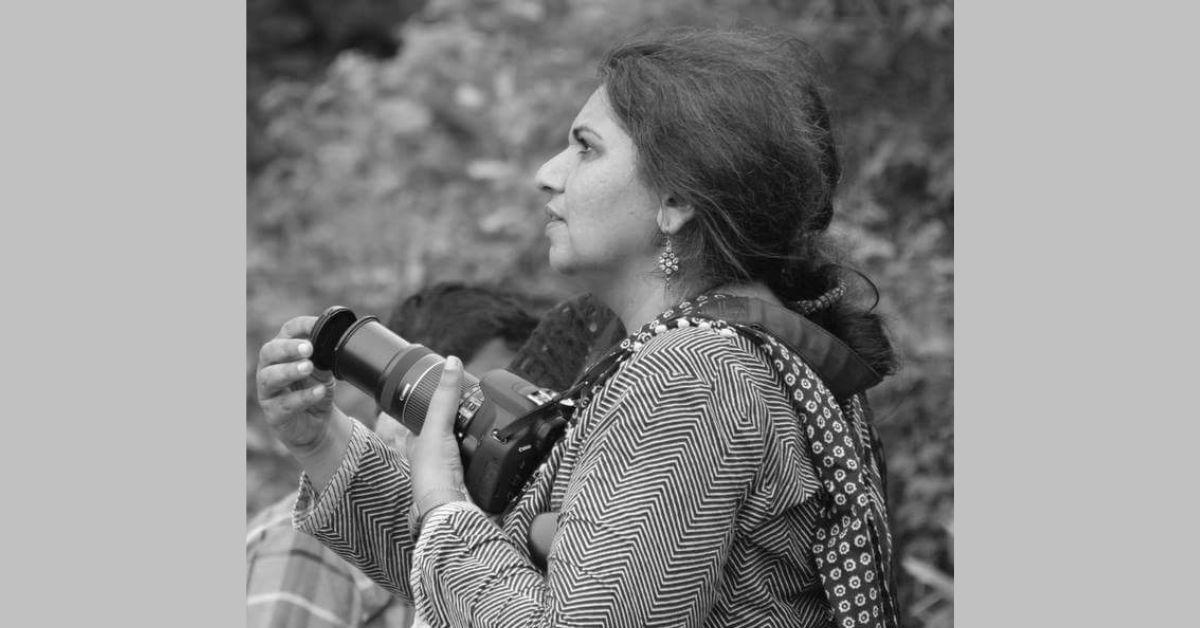Meet an Educator is a monthly series by Early Bird, where we feature the work of educators across India who are actively spreading the joy of birds and nature. This month’s featured educator is Kalpana Jayaraman, a university professor whose classes took on a new dimension as her students experienced nature in practical ways that were relevant to their local context and biodiversity.
“Nature education is ill taught within the boundaries of the classroom…..no opportunity is too small or to be missed.”
I was born in Delhi, completed my schooling in Jaipur and my P.G and Doctorate from the University of Rajasthan. I teach Zoology to undergraduate students at Stella Maris College in Chennai. Teaching has always been my passion, interacting with young minds keeps me current and gives me ample opportunities to share my learning and experiences with students.
Are you a birder? What about bird watching excites you?
I am a birder and butterfly watcher. The whole process of bird watching excites me, the expectation of a new experience, preparing for a trip, the actual experience, seeing a lifer (if I am lucky). I love to watch birds and their behaviour in different habitats. I find that focusing on birds is like meditating and it enriches me. Watching birds with like-minded people certainly makes things easier, we can set our own pace. I enjoy the small discoveries we make while watching birds and the discussions that ensue when we learn something new.
When and how did you get interested in bird/nature education?
In 2011, I taught a course in Conservation Biology for the first time. Talking about conservation and case studies in a classroom environment was suffocating and I started taking classes out on the campus grounds whenever possible. This led to a discovery of sorts, I started seeing the connection between what I was teaching and the natural world around me, even within the limited environs of the college campus. Certain areas on campus lent themselves as examples in understanding important concepts, I began to plan my lessons in and around those particular areas. The classes were satisfying to me and the students liked them too. I think this was when the seed of educating through nature was sown, Nature is certainly the best teacher.

Meanwhile, the Department of Zoology also introduced campus faunal surveys as part of the practicum that enabled all of us faculty to appreciate the biodiversity we have in the green spaces on campus. Documenting this biodiversity, trying to understand the role played by each organism, its behaviour, why we see it in a particular setting, curiosity about all this and more has resulted in tremendous learning for both faculty and students.
The Birding Buddies and the Birding Buddies Champions workshop I attended brought greater insight and focus on how we could get students interested in Nature and Natural History. We still have miles to go but with each batch of students we are refining our practice of nature education.
What do you hope to achieve through your education work?
The first goal would be to get the students to open their eyes and hearts to a appreciate, understand and form a love for Nature and all that it encompasses. I look forward to a generation of students who respect the environment and all the resources that Nature provides us with, a generation that shows a deep understanding and awe for the millions of years that have gone into making these resources and life forms and is willing to fight for them; a generation that practices conservation behaviour.
Why do you believe it is important for children to learn about birds or connect with nature?
Birds are charismatic species, can be observed anytime and anywhere and children connect to stories relating to them. Bird behaviour is almost human-like at times, and the way that birds interact with their own species and with others, the way they react to the environment; there are stories here that can be used to teach us all lessons on natural history, ecosystem, energy flow, interaction between living and non-living components and many more such concepts. This is real time learning, based on what can be observed and experienced. It’s not just birds though, insect life too lends itself to awesome nature education. It is only when children are engaged in regular contact with these denizens that they develop an attachment to the birds and/or insects, become curious about them and show concern for them.
What tools or resources have helped you in teaching about birds?
It is actual field trips, nature walks and surveys (especially on college campus) wherein students observe and report or question something that arouses their curiosity, which has helped the most. When students go after the why’s and how’s of what they observed (on their own), they learn best. Discovering an answer on one’s own through observations or plain reading up can be delightful and motivating. The answer itself could lead to more questions which is even better for an overall enriching learning experience. Other than that, experienced birders who are great communicators too have been inspirational in my experience and provide immense motivation to students.
The resources we generally use include bird games like bird bingo, bird habitat game, bird whispers; also bird doodling, bird sketching, quizzes, stories, presentations on common birds and on campus birds that our faculty have put together. All these add up in helping sustain an interest in birds. During field trips, the Early Bird field guide for different ecosystems is of immense help, it is so easy on the eye and to use.

Have you encountered a significant challenge as a bird/nature educator, how did you overcome it?
As college teachers, we are also involved in several administrative and other activities besides teaching our regular courses. Sometimes nature education sessions do take a back seat as we may need to prioritize other responsibilities. However, having some kind of goal and schedule that is flexible does come in handy. For example, we keep aside some important dates for campus bird surveys and try not to postpone or cancel such events. We are also training students so that they can conduct surveys on their own.
Bird/nature education is something we do out of passion and though we try to bring it into relevant courses, most of the time we need to engage students in such activities outside of college hours. Some students who reside far from the college thus find it difficult to participate as their commute time is high. For such students, certain event days such as the Campus Bird Count are immensely helpful as we conduct the bird surveys during class hours, when possible.
Field trips and nature walks I’ve found to be the best experience as far as learning is concerned. However, taking large groups on such outings is a challenge, logistically speaking. We have to compromise here at times by limiting the group size being taken on a field trip. Students who are genuinely interested are given preference. Anyways, we also find that our 19-acre college campus is a wonderful place to begin birdwatching and for nature walks, so the foundation for bird and nature study is laid here.
Do share any memorable experience that shaped your perspective in teaching about birds/nature.
My experience in teaching the conservation biology classes that I mentioned earlier was certainly insightful and drove home the point rather strongly – that nature education is ill taught within the boundaries of a classroom. Another such defining moment (in fact, several moments), was during a Rainforest Conservation Camp at Valparai where I was the only participant with a zoology background and yet I hardly seemed to know important aspects of or even the identifying features of the biodiversity I observed that there. My co-participants were from diverse professions – from business, medicinal field, IT, etc and yet had an incredible knowledge about so many plants and animals I had only heard about. I was truly inspired by that group. I feel that my need to educate myself further grew out of this trip to Valparai.
Teaching about birds through games has been a very memorable experience. A fun time is had by all and there is so much learning at the end of it. Another memorable event was bringing together interested students to form the Department’s Shikra Club to carry on nature-based activities.

Have you noticed any changes in your learners after they received exposure to birds and nature-based learning?
We find that nature-based learning is a new concept to most of the students when they join college after school. They take to this with great enjoyment. Their observation skills show a dramatic improvement as does their communication and networking skills. Photography is a hobby that some of them develop as they attempt to document whatever they see. On an average, in a batch of 50, we find that around 25 students show sustained interest and pursue nature-based studies even after leaving college. They prefer to do projects, internships on nature-based topics or choose to apply for post-graduation mainly in Zoology but also in Environmental Science and Wildlife Biology.
What message would you have for your fellow educators, or somebody starting out in their nature education journey?
Passion is the fuel that energizes a nature educator’s journey, and the reward is reaped when students reciprocate with interest and sensitivity towards the environment. There are disappointments and setbacks here too, like everywhere else, but it helps to bond with like-minded people to continue to walk this trail. One step at a time is another reminder that helps – no opportunity is too small or to be missed.


Great learning and interest
Enjoyed reading this interview. I had first heard about Kalpana from some of her students who used to volunteer at Madras Crocodile Bank. They always talked about how inspiring she is. Later, I met her Valparai and we got along immediately. That trip we both learnt a lot from each other. I wish I had a teacher like her. Today a lot of her students are on their way to make careers in the field of wildlife and conservation. A teacher can make such s big difference in our life. So thank you Kalpana Ma’am for being what you are and love what you do. 🙂